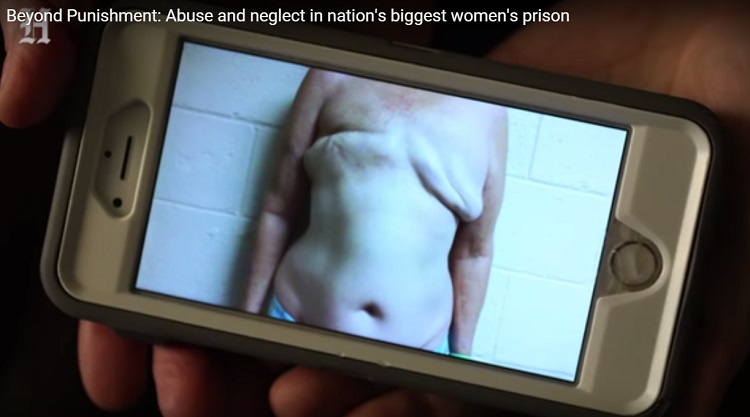
Image via YouTube screengrab
An investigative series produced by The Miami Herald, “Beyond Punishment,” exposed the ugly truth about Lowell Correctional Institution for women, America’s largest women’s prison.
“We’re prey. It’s like a lion with a bunch of gazelles,” one inmate told the Herald.
“Behind the razor wire fences of the nation’s largest women’s prison, complaints of rampant sexual, physical and mental abuse are frequently reported by inmates against the very corrections officers put in place to guard them.”
In the Herald video at the bottom of this post, prisoners describe horrifying conditions and detail the sexual abuse they experienced from male guards while serving time at Lowell.
In addition to the physical and mental abuses, the report exposed abysmal conditions including a decade of medical neglect, serious misdiagnoses, delays in treatment and failure to provide routine medications for inmates with fatal illnesses.
With only two doctors, two advanced nurse practitioners and about twenty-four licensed practical nurses (LPNs) overwhelmingly tasked with treating 2,700 inmates, the Florida Department of Corrections calls Lowell “dangerously understaffed.”
The Herald’s investigation reviewed five years of audits, complaints, surveys and inspections at the correctional facility. The investigation found that since a private corporation, Corizon, began running the prison in 2013, healthcare has suffered a significant decline. Examples of troubling neglect and abuse include, “colonoscopies for inmates with unresolved bleeding that weren’t ordered; vaccinations and immunizations for hepatitis that were never initiated; oncology follow-ups that never happened; tests that were denied and postpartum exams that occurred four weeks late; no follow-up for an inmate with acute head trauma; ultrasounds that were ordered but not carried out; inmates with HIV never treated; inmates with histories of breast cancer deprived of their medication.”
Moreover, health inspections by the U.S. Department of Agriculture revealed rotten, rancid meat was served to the prisoners in 2012 as well as water infested with parasites. Reports of worms emerging from bathroom sinks and toilets were received by the Federal Department of Corrections in 2014 and more disturbing, FDC’s inspections reported, black larvae, bugs and other parasites were found in “filthy” drains and sinks. The investigation also revealed that over the past two years, prison kitchens have had rat infestations, cockroaches and flies.
In June of 2015, The Guardian published an article by Chandra Bozelko titled: “Prisons that withhold menstrual pads humiliate women and violate basic rights.”
Bozelko wrote:
“When the York Correctional Institution became coed during my sentence – merging the old Gates Correctional Institution and the women’s prison – a lieutenant who spent his career at York and was unaccustomed to working with male inmates told a group of inmates that the men would rather defecate in their pants than ask him for toilet paper and get jerked around for it.
To ask a macho guard for a tampon is humiliating. But it’s more than that: it’s an acknowledgement of the fact that, ultimately, the prison controls your cleanliness, your health and your feelings of self-esteem. The request is even more difficult to make when a guard complains that his tax dollars shouldn’t have to pay for your supplies. You want to explain to him that he wouldn’t have a paycheck to shed those taxes in the first place if prison staff weren’t needed to do things like feeding inmates and handing out sanitary supplies – but you say nothing because you want that maxi pad.”
Healthcare and proper cleanliness are basic human rights, not a luxuries; even in prison.
Read the Herald’s entire investigative series HERE for more details.
Like Kimberley A. Johnson on Facebook HERE, follow her HERE. Twitter: @authorkimberley

You must be logged in to post a comment Login